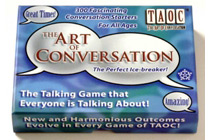It’s Saturday afternoon. We are looking after our granddaughters. They are happily playing on the Xbox Kinect, and with their tablet. I am on the computer doing some writing, checking my emails and updating my Facebook. Their grandfather is watching a game of rugby on the TV
When we are all connected to our various electronic devices for too many hours we don’t talk much at all, and when we do it sounds more like tweets than meaningful conversations.
So when asked to evaluate a new game called TAOC (The Art of Children’s Conversation) developed by Australians Louise Howland and Keith Lamb I was keen to do so.
 The publicity blurb states:
The publicity blurb states:
“We are always being told that the art of conversation is dead – killed by everything from TV to e-mail to texting to our 24/7 always connected lifestyle. But a new game promises to help children to become confident speakers, better listeners and all round communicators”
TAOC will help them to
- Become a person who is able to speak well
- Have interesting conversations
- Share ideas and feelings
- Listen and understand what other people are about
- And understand and think about your own life
TAOC is a pack of cards with 300 discussion starters. It’s not a quiz to test who knows most.
Now how could I persuade these girls to play a game that has no losers or winners?
“It’s a talk show,” I said
This sounded a bit unusual but they agreed to give it a go.
We sat in a circle and I explained how we should proceed.
“The leader takes a card from the top of the pack and asks the first question.
 And everyone takes a turn to answer it.
And everyone takes a turn to answer it.
Once everyone has had a say, another person leads the next round, and we talk about something else.”
The topics were wide ranging but they were carefully chosen to be ones that children could talk about. For instance:
- Do you have a dream that you wish would come true?
- Have you ever wished you were a character in a book, movie or television show? If so, who, and why?
- What do you think is more important? To be wealthy, to be healthy or to be famous?
- What should we do to keep the world clean and healthy?
- How can you make some-one else’s life happier?
- How do you try to get out of doing something you don’t want to do?
I was impressed by the way they really listened to each other and were not shy to express their points of view. I learnt more about them and their world, and they also learnt something from me as we shared our stories.
A game of TAOC can be as long or a short as you like. Once they have played it a couple of times you could give them a further challenge to see who can talk the longest on a particular topic. Or you could use one of the questions as a conversation starter at any time of the day. For instance when you are ferrying children round in the car, at the dinner table or at bedtime when they will be happy to engage in any conversation that will allow them to stay up just that little bit longer.
I would hate to go back to the twilight zone of pre electronic devices. They have opened up so many new ways of connecting and learning. And I don’t think they need to be the bogey that is killing the art of conversation. As long as we encourage our grandchildren not to use them excessively when they are at our house, and when they are switched off to think up other activities we can do together and to spend more time talking with them.
The road to becoming a good conversationalist is walked in small steps, rather than big leaps. As Grandparents we can be a part of that journey.
And who knows how important the part we play might be? Think of the spunky white-haired granny in the Lorax. If she hadn’t talked to her grandson, Ted would never have found out what happened to trees and gone on his mission to find the last seed.
So what do you think?
Is the Art of Conversation dying in your house? And if so what kind of strategies can you think of to revive it?









Join the Discussion
Type out your comment here:
You must be logged in to post a comment.